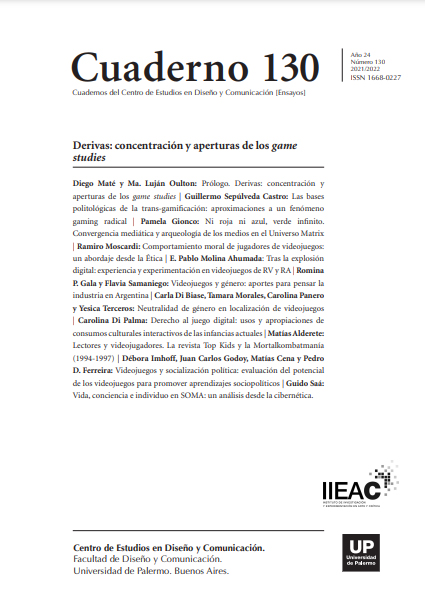Videojuegos y socialización política: evaluación del potencial de los videojuegos para promover aprendizajes sociopolíticos
Resumen
Proponemos pensar a los videojuegos como escenarios donde se producen aprendizajes socio-políticos, esto es, como ámbitos de socialización política. Considerando esto, el trabajo indagó el potencial político de videojuegos explorando los aprendizajes socio-políticos identificados por sus usuarios/as, y precisando su vinculación con hábitos, experiencias y actitudes hacia los videojuegos y con variables psicopolíticas (eficacia política interna, participación política individual y colectiva). Se realizó un estudio empírico cuantitativo con 750 estudiantes y docentes universitarios/as de Argentina, seleccionados/ as mediante muestreo no probabilístico accidental.
Citas
American Psychological Association. (2017). Ethical Principles of Psychologists and Code of Conduct. Recuperado de https://www.apa.org/images/ethics-code-2017_tcm7-218783.pdf
Bogost, I. (2006). Playing Politics: Videogames for Politics, Activism, and Advocacy. First Monday, 7.
Bogost, I. (2007). Persuasive games: Videogames and procedural rhetoric. Cambridge: MIT Press.
Cabañes, E. & Jaimen, N. (2021). Videojuegos para la participación ciudadana. Cuadernos del Centro de Estudios en Diseño y Comunicación [Ensayos] 23(98), 151-161.
Curry, K. (2010). Warcraft and Civic Education: MMORPGs as Participatory Cultures and How Teachers Can Use Them to Improve Civic Education. The Social Studies, 101(6), 250-253.
Dahya, N. (2009). Serious Learning in Playful Roles: Socio-political games for education and social change. Loading…, 3(4).
Dalisay, F.; Kushin, M. J.; Yamamoto, M.; Liu, Y. I. & Skalski, P. (2014). Motivations for game play and the social capital and civic potential of video games. New Media & Society, 17(9), 1399-1417.
Domínguez, A. K. (2021). Diseño de videojuego como terapia de juego para niños con Asperger. Cuadernos del Centro de Estudios en Diseño y Comunicación [Ensayos] 23(98), 129-140.
Entertainment Software Association (2019). 2019 Essential Facts About the Video Game Industry by the ESA. Recuperado de https://www.theesa.com/wp-content/uploads/2019/05/2019-Essential-Facts-About-the-Computer-and-Video-Game-Industry.pdf
Eränpalo, T. (2014). Exploring Young People’s Civic Identities through Gamification: A Case Study of Finnish, Swedish and Norwegian Adolescents Playing a Social Simulation Game. Citizenship, Social and Economics Education, 13(2), 104-120.
Ferguson, C. J, & Garza, A. (2011). Call of (civic) duty: Action games and civic behavior in a large sample of youth. Computers in Human Behavior, 27(2), 770-775.
Ferreira, P. & Menezes, I. (2005). The relevance of the quality of life-experiences for citizenship development: na inter-domain developmental study. En Menezes, I.; Coimbra, J. y Campos, B. (Eds.) The affective dimension of education: European perspectives (pp.185- 201). Portugal: FCT, Universidade do Porto.
Ferreira, P.; Azevedo, C. & Menezes, I. (2012). The developmental quality of participation experiences: Beyond the rhetoric that “participation is always good!” Journal of Adolescence, 35, 599-610. doi:10.1016/j.adolescence.2011.09.004
Gala. R. (2021). Un acercamiento posible a la creación de videojuegos políticos en Buenos Aires. Cuadernos del Centro de Estudios en Diseño y Comunicación [Ensayos] 24(110), 35-52.
Godoy, J. C. (05 de agosto de 2016). Jugar puede ayudar a hacer un mundo mejor. La Voz del Interior.Gonzalez, C.; Saner, L. & Eisenberg, L. (2013). Learning to stand in the other’s shoes: A computer video game experience of the Israeli-Palestinian Conflict. Social Science Computer Review, 31(2), 236-243.
Gordon, E. & Koo, G. (2008). Placeworlds: Using Virtual Worlds to Foster Civic Engagement. Space and Culture, 11(3), 204-221.
Hassan, L. (2017). Governments Should Play Games: Towards a Framework for the Gamification of Civic Engagement Platforms. Simulation & Gaming, 48(2).
Hassan, L. & Hamari, J. (2020). Gameful civic engagement: A review of the literature on gamification of e-participation. Government Information Quarterly.
Haste, H. (2004). Constructing the Citizen. Political Psychology, 25 (3), 413-439.
Imhoff, D. & Brussino, S. (2017). Socialización política: la dialéctica relación entre individuo y sociedad. En Brussino, S. (Comp.) Políticamente, contribuciones desde la psicología política en Argentina (pp.37-70). Bs. As.: CONICET.
Imhoff, D. & Brussino, S. (2019) Effect of political socialization on children: quasi-experimental study with Argentinian children. Infancia y Aprendizaje, 42 (1), 179-243. DOI: 10.1080/02103702.2018.1555203.
LeCompte, K.; Moore, B. & Blevins, B. (2011). The Impact of iCivics on Students’ Core Civic Knowledge. Research in the Schools, 18(2), 58-74.
Lee, N. J.; Shah, D. V. & McLeod, J. M. (2013). Processes of political socialization: a communication mediation approach to youth civic engagement. Communication Research, 40(5), 669-697.
Lenhart, A.; Kahne, J.; Middaugh, E.; Macgill, A. R.; Evans, C. & Vitak, J. (2008). Teens, video games, and civics: teens’ gaming experiences are diverse and include significant social interaction and civic engagement. Pew internet & American life project. Recuperado de http://www.pewinternet.org/2008/09/16/teens-video-games-and-civics/
Maté, D. (2021). Game studies: apuntes para un estado de la cuestión. Cuadernos del Centro de Estudios en Diseño y Comunicación [Ensayos] 23(98), 19-35.
Molyneux, L.; Vasudevan, K. & Gil de Zúñiga, H. (2015). Gaming Social Capital: Exploring Civic Value in Multiplayer Video Games. Journal of Computer-Mediated Communication, 20(4), 381-399.
Oulton, L. (2021). Prólogo. Cuadernos del Centro de Estudios en Diseño y Comunicación [Ensayos] 23(98), 11-18.
Robinson, N. (2012). Videogames, Persuasion and the War on Terror: Escaping or Embedding the Military - Entertainment Complex? Political Studies, 60(3).
Roussos, G. & Dovidio, J. F. (2016). Playing below the poverty line: Investigating an online game as a way to reduce prejudice toward the poor. Cyberpsychology: Journal of Psychosocial Research on Cyberspace, 10(2).
Sandoval Forero, C. G. & Sánchez, A. T. (2017). El videojuego como herramienta prosocial: implicaciones y aplicaciones para la reconstrucción en Colombia. Análisis Político, 30(89), 38-58.
Sepúlveda Castro, G. (2021). Transgamificación y cultura: del videojuego como producto cultural al videojuego como totalidad cultural. Cuadernos del Centro de Estudios en Diseño y Comunicación [Ensayos] 23(98), 175-187.
Sicart, M. (2009). Mundos y Sistemas: entendiendo el Diseño de la Gameplay Ética. Comunicación, 7(1), 45-61. Recuperado de: https://idus.us.es/handle/11441/58049
Sitzmann, T. (2011). A meta-analytic examination of the instructional effectiveness of computer-based simulation games. Personnel Psychology, 64(2), 489-528.
Los autores/as que publiquen en esta revista ceden los derechos de autor y de publicación a "Cuadernos del Centro de Estudios de Diseño y Comunicación", Aceptando el registro de su trabajo bajo una licencia de atribución de Creative Commons, que permite a terceros utilizar lo publicado siempre que de el crédito pertinente a los autores y a esta revista.


